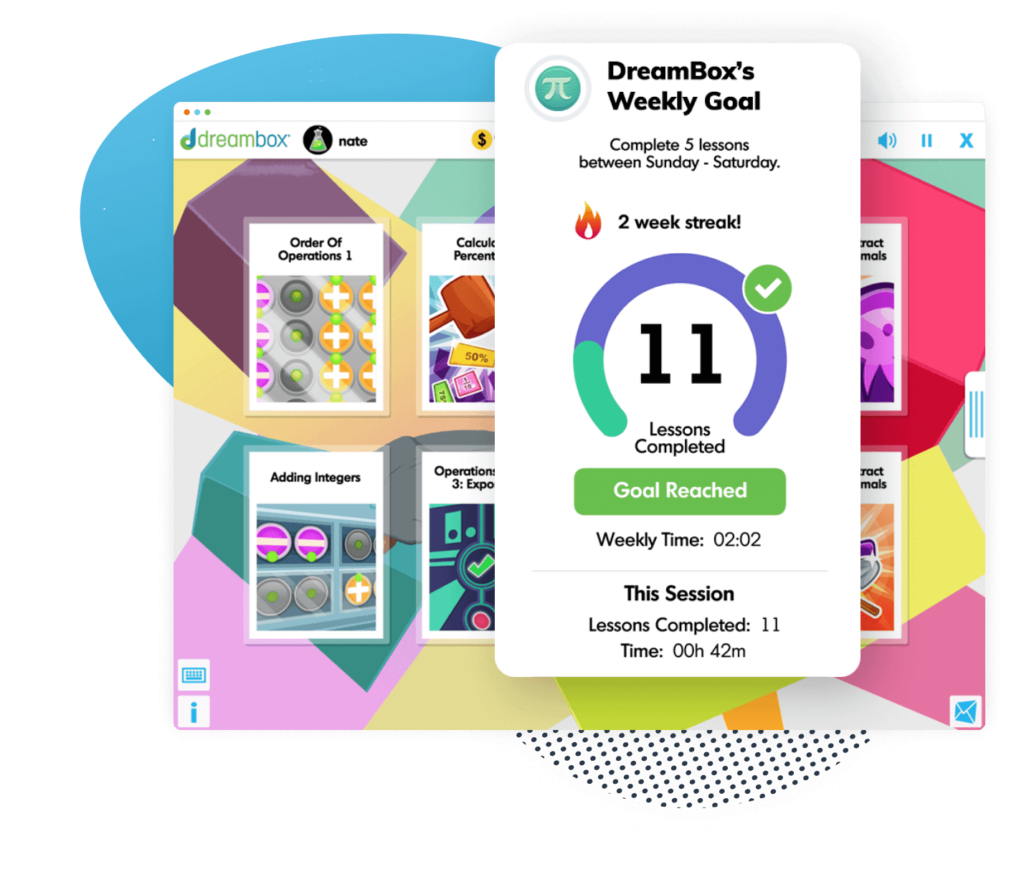What's the Best Homeschool Math Curriculum?
With so many homeschool math options, picking the right one can be tough, but don’t worry! We’ll simplify the process and help you make the best choice for your family.

Author
Katie Wickliff
Published:
January 2025
Key takeaways
- Choosing the best homeschool math curriculum depends on your learner’s needs, your educational goals, your budget, and many other factors.
- Consider combining programs or using supplemental resources to provide your child with a complete math education.
- Today’s homeschool math programs are fun and challenging, helping kids enjoy math while learning important skills.
Table of contents
Homeschooling provides parents and caregivers with a great opportunity to tailor education to their child’s needs. This is particularly valuable in subjects like math, where different approaches may better suit a child’s learning style.
However, with so many homeschool math curricula available, choosing the right one can take time and effort. To help you navigate this decision, we’ve compiled a list of the top homeschool math curriculum available for elementary-aged students, covering the pros, cons, intended grade levels, and the type of students it might best benefit.
We’ve also included a list of questions to ask yourself to help you choose the best homeschool math curriculum for your child.
Questions to ask yourself when choosing a homeschool math curriculum
Choosing a homeschool math program depends on several factors. Here are some key questions you should ask yourself when considering your options:
What are my child’s learning needs and style?
- What specific areas does my child need more support or challenge?
- Does my child prefer visuals, auditory explanations, or hands-on activities?
What are the learning goals for my child?
- Does my child need foundational skills, or are they ready for an advanced approach?
- Do I want the curriculum to focus on theoretical concepts, practical applications, or both?
What is my budget for a homeschool math curriculum?
- Are all costs included in the program, or are there additional fees for materials, supplementary resources, etc?
How much time can I dedicate to teaching math each week?
- Am I looking for a comprehensive and time-consuming program, or would I prefer an approach that allows my child to self-direct?
What is my comfort level with teaching math?
- Do I need a program with detailed lesson plans and teacher support?
How does the curriculum approach math instruction?
- Does the curriculum use a mastery or spiral-based approach?*
- Can the curriculum be adapted to different learning paces or needs?
When picking a math homeschool curriculum, it’s beneficial to pair it with an enrichment resource to keep your child engaged and having fun! DreamBox Math is an excellent option, whether used on its own or as a complementary addition to any homeschool math program.
Different types of math approaches*
When choosing a math curriculum, you’ll often hear about conceptual math, procedural math, spiral approach, and mastery approach. I’ve provided simple definitions below!
Conceptual Math: explains the reasons “why” mathematical operations work.
Procedural Math: teaches students a series of steps (i.e. an algorithm) that they must complete to find a solution.
Mastery Approach: focuses on one skill at a time. Students learn a topic thoroughly before moving on to the next one. Each concept is taught in a block and not revisited immediately.
Spiral Approach: reviews the same skills multiple times, increasing in complexity each time it is revisited.
Homeschool math curriculum comparisons (in alphabetical order)
Grade Levels: K-5
Overview: Beast Academy is an engaging program that uses comic books, puzzles, games, and comic book elements to teach math concepts.
Pros: Attractive format; challenging content that promotes critical thinking; a variety of supplemental resources and games.
Cons: May be too challenging for some learners. Because of this, kids may move too slowly through the problems and become frustrated.
Best for: Students who do well in math but become bored with repetitive practice.
Grade Levels: K-8
Overview: Dreambox is an adaptive learning curriculum that uses a game-based approach to teach math.
Pros: Engaging and fun for a wide age range; mastery approach ensures that students understand concepts before moving on.
Cons: Not a complete curriculum; intended to be a complementary resource.
Best for: Students who need supplemental math practice.

The math program that drives results
Get started today!
DreamBox adapts to your child’s level and learning needs, ensuring they are appropriately challenged and get confidence-building wins.
Grade Levels: K-12
Overview: Life of Fred uses a narrative approach to teach math through the adventures of a six-year-old math professor. This curriculum blends math into real-world situations.
Pros: Engaging narrative approach integrates math into everyday life; encourages critical thinking; shows how math is useful.
Cons: Less structured than other homeschool math curriculum choices; best as supplementary resource.
Best for: Kids who love stories and thrive on creative learning.
Grade Levels: 1-8
Overview: Math Mammoth offers a comprehensive math curriculum homeschool parents will appreciate–both for the clear explanations and the emphasis on number sense.
Pros: Systematic approach; emphasis on concept mastery; self-directed.
Cons: Less interactive compared to other math programs.
Best for: Budget-conscious homeschool families looking for a complete curriculum with little teacher preparation.
Grade Levels: K-12
Overview: Math-U-See uses visual aids and manipulatives to provide students with a hands-on way of learning math. The curriculum offers explicit instructions and focuses on students achieving mastery before progression to the next concept.
Pros: Visual and tactile learning, excellent explanation of math concepts; adaptable to different learning paces and styles.
Cons: May not be challenging enough for advanced learners; may not dive deeply enough into certain math concepts.
Best for: Students who benefit from a structured, sequential approach with physical manipulatives.
Grade Levels: K-12
Overview: RightStart Math is influenced by the Montessori method, using games and manipulatives to build a solid math foundation. The AL Abacus (a simplified abacus) is included and helps students model math problems and solutions.
Pros: Emphasis on number sense and mental math; engaging learning activities and games; emphasis on concepts and foundational skills.
Cons: Requires a good deal of parental support to prepare manipulatives and guide students through the learning process.
Best for: Children who love kinesthetic learning; families who are familiar with the Montessori method and who have dedicated time for math games and activities.
Grade Levels: K-12
Overview: Saxon Math aligns with Common Core and uses a spiral method to continually review skills and concepts. This curriculum emphasizes solid math practice and skill assessment.
Pros: Very thorough lesson plans and instructions, which can be helpful for parents who are less confident teaching math. The spiral method helps students retain skills and concepts.
Cons: The structured formula is less flexible than others, which may not work for all learning styles. Focuses on rote memorization and worksheets; lacking interactive activities.
Best for: Students who learn well using traditional methods and drills; homeschool teachers looking for detailed lesson plans and practice problems.
Grade Levels: PreK-8
Overview: Singapore Math focuses on problem-solving and critical thinking. The program introduces concepts concretely before transitioning to more abstract representations.
Pros: Strong emphasis on foundational, concrete understanding. Structured progression from simple to complex.
Cons: May be too fast-paced or challenging for some students.
Best for: Advanced learners; homeschool teachers comfortable with math instruction.
DreamBox Makes Learning Math Fun
Selecting the right math curriculum for your homeschool can help your child achieve success in elementary school and beyond. Dreambox Math is an interactive, game-based program that adapts to your student’s needs—making it the perfect choice for any homeschool classroom.
FAQs about the Best Homeschool Math Curriculum
The best homeschool math curriculum depends on several factors, including your child’s learning needs, your budget, your comfort level teaching math, and your preferred math approach. Some of the best homeschool math programs include:
- Beast Academy
- Dreambox Math
- Life of Fred
- Math Mammoth
- Math-U-See
- RightStart Math
- Saxon Math
- Singapore Math
Spiral math reviews the same concepts and skills multiple times. The mastery math approach requires students to understand the concept before moving on to the next.
One game-based homeschool math program is DreamBox. This program uses adaptive technology to meet the learning needs of each student. The program uses games, adventures, and activities to engage students and make learning math fun.
Take at home math practice to the next level
Empowering parents and educators to make math practice more impactful. Plus, your kids will love it.


